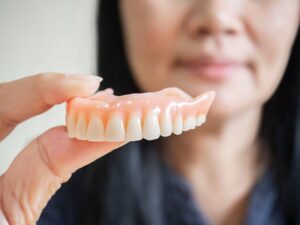
Adjusting to life with dentures involves more than just learning to chew or speak clearly again. Many people also notice changes in their sense of taste. While dentures are essential for restoring function and confidence after tooth loss, they can sometimes have an impact on how food tastes. If you’re wondering why your favorite meals don’t seem quite the same, you’re not alone. Let’s explore how dentures may affect your sense of taste and what you can do about it.
The Roof of Your Mouth Plays a Role in Taste
One of the main reasons dentures can affect your sense of taste has to do with the palate, or the roof of your mouth. Full upper dentures cover this area, which is home to taste buds and plays a key role in detecting flavors, especially subtle ones. When the palate is covered by acrylic denture material, it can block the food’s contact with this area, dulling your ability to fully enjoy certain tastes.
Changes in Saliva Production
Saliva helps carry food molecules to taste buds, making it easier to identify flavors. Wearing dentures, especially new ones, can sometimes reduce saliva flow or lead to dry mouth (xerostomia), both of which can interfere with how you experience taste. A dry mouth can also make it more difficult to chew and swallow, adding to the frustration.
Poor Fit and Residue
If your dentures don’t fit properly, they can move around while you eat, trapping food particles and creating discomfort. In some cases, poorly fitting dentures may allow for bacteria buildup, which can lead to bad breath and an unpleasant taste in the mouth. Additionally, denture adhesives, if overused or not properly cleaned, may leave a lingering taste that affects your enjoyment of food.
Natural Changes with Age
It’s important to remember that aging also affects your sense of taste. Taste buds can become less sensitive over time, and conditions common in older adults, such as medication use, illness, or smoking history, can also contribute to a duller sense of flavor. In some cases, the taste change may not be caused by the dentures alone, but by a combination of factors.
What You Can Do About It
If your dentures are affecting your sense of taste, here are a few steps you can take:
- Ask about implant-supported dentures: These dentures don’t cover the roof of your mouth, which can help preserve more of your natural taste function.
- Stay hydrated: Drink plenty of water throughout the day to combat dry mouth.
- Clean dentures daily: Thorough cleaning removes odor-causing bacteria and old adhesive that can affect taste.
- Have your fit checked: Ill-fitting dentures should be adjusted or replaced by your dentist.
- Experiment with foods: You may need to adjust your seasoning or try different textures and temperatures to make food more enjoyable.
While dentures can affect your sense of taste, especially at first, there are effective ways to manage and minimize the impact. Regular dental checkups, proper care, and thoughtful food choices can help you continue enjoying meals and maintaining good nutrition, even with the restoration.
About the Author
Dr. Adriana Zaharie (“Dr. Z” to her patients) is a graduate of the University of Pittsburgh School of Dental Medicine. She has continued her education by attending advanced post-doctoral study programs, including the Periodontist Study Club and Viva Dental Seminars. Dr. Zaharie has dedicated much of her focus to clear aligners and cosmetic dentistry to give her patients the look they desire. If you’re seeking restoration of look and functionality with dentures, Dr. Zaharie and our expert team can outfit you with one of our multiple appliances for the right solution. Schedule your appointment online or call us at (281) 394-4001.
